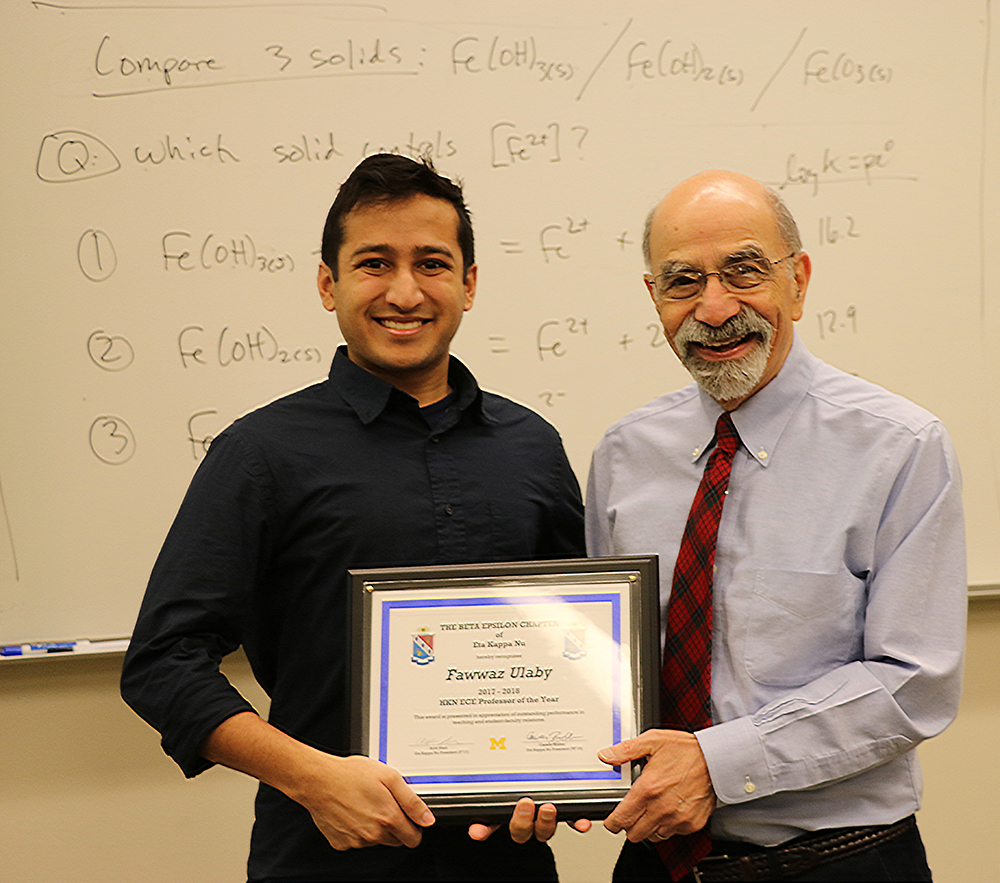The Key to Superior Teaching Performance in Engineering
Fawwaz Ulaby, Emmett Leith Distinguished University Professor Emeritus of Electrical Engineering and Computer Science, has always prioritized teaching amidst his other responsibilities as a world-renowned researcher, and has been widely decorated for his efforts by students as well as his peers.
Invited by the Associate Dean for Undergraduate Education in the College of Engineering, Kevin Pipe, to share some of the secrets of his success, Ulaby offered a lecture to current faculty members throughout the College.
“Prof. Ulaby is well known among our Engineering community as an outstanding instructor,” said Pipe, “and his seminar was a great opportunity for a large number of our faculty to learn from his wisdom and tips for how to better connect with students and improve their understanding of course material.”
“Superior teaching, in my definition, is when both the mechanics and the culture are paid a great deal of attention.”
Fawwaz Ulaby
His target audience was faculty relatively new to teaching who are looking to improve their teaching methods. The Center for Research on Learning and Teaching in Engineering (CRLT-E) offers a variety of resources to assist faculty – young and old. But some faculty go directly to the source – and that source is often Ulaby.
“Fawwaz helped me with my teaching in ways that I am so grateful for,” said Prof. Somin Lee, who approached Ulaby shortly after arriving at Michigan. “I remember Fawwaz saying to ‘always put students’ best interests first, everything else flows from that.’ Designing the class with that perspective in mind made all the difference!”
In his talk, presented to the faculty on October 6, 2022, Ulaby said that his method will result in improved student learning, and a genuine, professional bond with the student. To that end, his talk focuses on both the mechanics of teaching (lectures, homework, exams, etc) and the culture (connection between the instructor and the students).
“Superior teaching, in my definition,” says Ulaby, “is when both the mechanics and the culture are paid a great deal of attention.”
Taking a sophomore-level undergraduate class as his example, Ulaby described his approach, which begins a week before the first day of class. He then shared tips for the first day of class, how to conduct 1-1 meetings with the students, his lecture style, and the value of using tech briefs (short explanations of how familiar technology, such as a smartphone, connects to the basics that are in the course) to get students excited about the fundamentals they’re about to learn.
I remember Fawwaz saying to ‘always put students’ best interests first, everything else flows from that.’ Designing the class with that perspective in mind made all the difference!
Somin Lee
Judging from student evaluations, his techniques work. He not only received extremely high teaching evaluations, his classes (pre-pandemic) featured attendance rates exceeding 95%.

His efforts led to him receiving the HKN Best Professor award three different times, an award that’s voted on by all students in the department. He also was named one of the 10 best faculty in the entire university – this time voted on by all 47,000+ students in the university.
Ulaby also earned the IEEE James H. Mulligan Education Medal, the HKN C. Holmes MacDonald Outstanding Teaching Award, and two institutional awards from his former institution, University of Kansas. And he was named Arthur F. Thurnau Professor, a distinction bestowed on faculty at Michigan for their outstanding contributions to undergraduate education.
He has written numerous textbooks, including Fundamentals of Applied Electromagnetics, now in its 8th edition, and more recently co-authored three textbooks that helped launch his Free Electrical and Computer Engineering Textbook Initiative. The eight textbooks already published as part of this initiative have been downloaded by students around the world, and saved them an estimated $25M.
In Ulaby’s classes, students understand that they are not competing against each other. They are competing against their own potential. When a class is taught this way, says Ulaby, “the grading is done differently, the lectures, all of it.” And it works!


 MENU
MENU